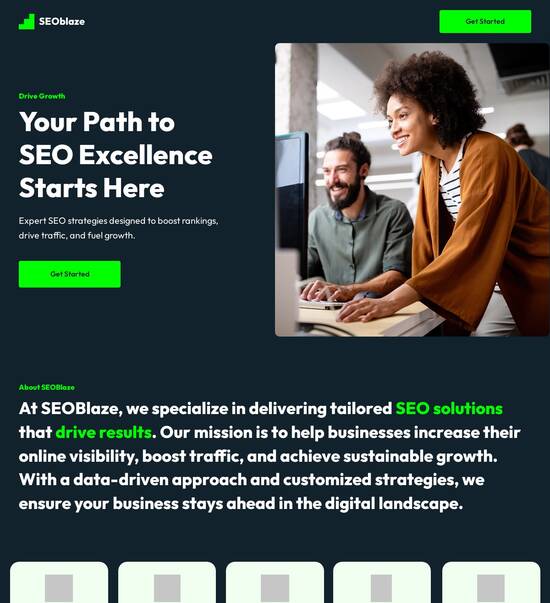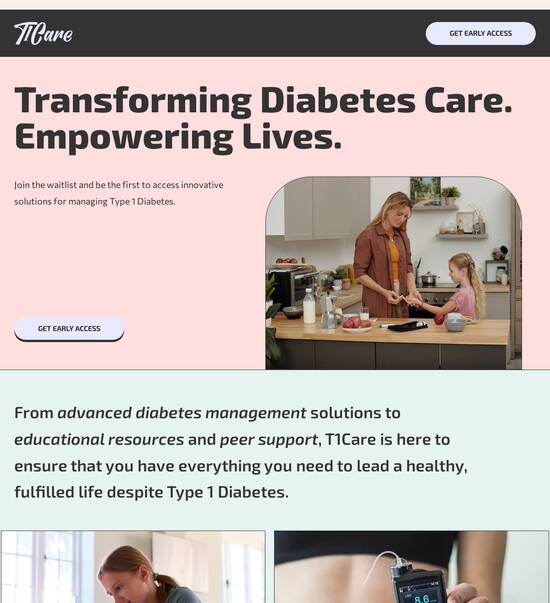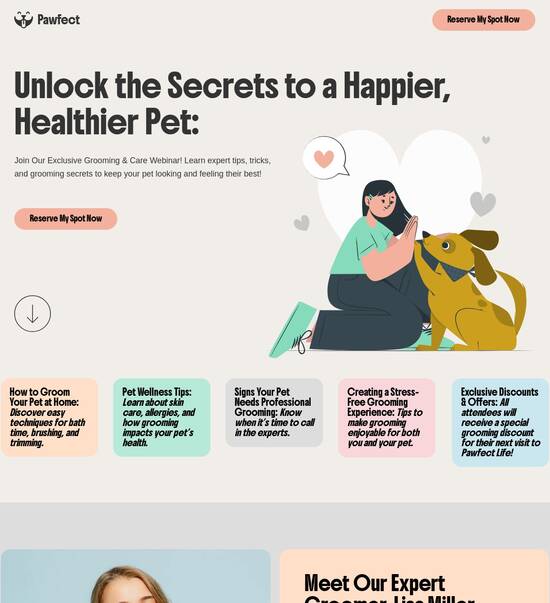
HTML page template with interactive travel reservation form
Explore Similar TemplatesAbout template
Use HTML page templates with interactive travel reservation form and make your communications easy and transparent. Try our solution today.
Recommended templates

Easy to build without coding
With the intuitive drag-and-drop builder, anyone on your team can create high-converting pages without any knowledge of code or design. Make enhancements to your landing page with custom widgets using Javascript, HTML/CSS, or third-party scripts.

Multiple layouts for any industry and goal
Select from 500+ landing page layouts built to boost conversions across industry-specific scenarios. Customize them by adjusting fonts, adding images, and generating on-brand content with the AI assistant. Quickly scale with Instablocks® and Global Blocks that you can save, reuse, and update globally.

Loads fast and looks polished on any device
Every template is responsive, which means they present professionally on any device and load blazingly fast with our Thor Render Engine. You can also power them up with Google AMP technology to deliver an unparalleled mobile experience and drive higher conversions.

Robust analytics & experimentation
Get real-time updates and reporting across all your devices, showing the number of visitors, conversions, cost-per-visitor, and cost-per-lead. Launch AI-powered experiments, run A/B tests, and use heatmaps to analyze user behavior, then optimize your landing page to maximize conversions.







Easy to build without coding
With the intuitive drag-and-drop builder, anyone on your team can create high-converting pages without any knowledge of code or design. Make enhancements to your landing page with custom widgets using Javascript, HTML/CSS, or third-party scripts.
Multiple layouts for any industry and goal
Select from 500+ landing page layouts built to boost conversions across industry-specific scenarios. Customize them by adjusting fonts, adding images, and generating on-brand content with the AI assistant. Quickly scale with Instablocks® and Global Blocks that you can save, reuse, and update globally.
Loads fast and looks polished on any device
Every template is responsive, which means they present professionally on any device and load blazingly fast with our Thor Render Engine.
Robust analytics & experimentation
Get real-time updates and reporting across all your devices, showing the number of visitors, conversions, cost-per-visitor, and cost-per-lead. Launch AI-powered experiments, run A/B tests, and use heatmaps to analyze user behavior, then optimize your landing page to maximize conversions.
All the features you need to build lead-generating landing pages
Explore more featuresLearn how to build top-performing landing pages for any goal
FAQs
Leading the way in building high-performing landing pages





Unlock the potential of your marketing with Instapage's powerful landing page and CRO platform
Instapage is designed to transform how marketers approach digital campaigns. This all-in-one landing page and conversion rate optimization (CRO) platform provides an essential toolkit that drives results no matter the campaign size or budget. It empowers you to create, optimize, and scale campaigns efficiently, ensuring a maximum return on your marketing investments.
Key features that enhance your campaigns
Instapage stands out due to its robust features that streamline the landing page creation process. From customizable templates to real-time collaboration tools, every feature is centered around ease of use and high performance.
- 100+ ready-to-use templates: Get started instantly with templates designed to convert visitors into leads.
- Built-in experimentation: Utilize A/B testing and heatmaps to gauge user engagement and enhance page performance.
- Seamless collaboration: Enable your team to work together in real time, sharing edits and feedback effortlessly.
Step 1: Creating your landing page
Creating a landing page with Instapage is streamlined to reduce effort and maximize efficiency. Follow these steps to set up your page quickly.
- Choose a template: Select from a variety of conversion-focused designs that suit your campaign goals.
- Customize elements: Adjust text, images, and calls-to-action to align with your branding and messaging.
- Launch your page: Use the one-click publish option to go live within minutes, ensuring you capture leads efficiently.
Step 2: Optimizing for conversions
Optimization is key to boosting your conversion rates. Here’s how you can effectively enhance your landing pages.
- Implement A/B tests: Regularly test different headlines, images, and CTAs to determine what resonates best with your audience.
- Utilize analytics tools: Monitor detailed metrics to see where users drop off and identify areas for improvement.
- Make iterative changes: Use heatmap insights to guide your adjustments for ongoing optimization.
Step 3: Personalizing user experiences
Personalization significantly impacts conversion rates. Here's how to tailor your content for better engagement.
- Dynamic text replacement: Deliver content that speaks directly to your audience’s interests by adjusting on-page text dynamically.
- Segment audiences: Use AdMaps to serve relevant ads tailored to specific landing pages, improving message alignment.
- Track audience metrics: Employ advanced data analytics to understand how different segments respond and interact with your content.
By harnessing the features of Instapage, marketers can effectively engage their target audiences and drive successful campaigns. Whether you're a small business or a large enterprise, Instapage has the tools to help you achieve your marketing goals.
Ready to elevate your marketing efforts? Start leveraging Instapage now to create stunning, high-converting landing pages. Sign up today for access to all features!
People also ask about HTML page template with interactive travel reservation form
HTML Page Template with Interactive Travel Reservation Form: A Deep Dive
Crafting the digital gateway: HTML as the backbone
HTML, or HyperText Markup Language, serves as the foundational structure for web pages. It allows developers to create the basic layout and elements of a website, making it essential for any online application, including travel reservation forms. An effective HTML structure is critical for ensuring that forms are easily navigable, visually appealing, and functional, ultimately enhancing user satisfaction and conversion rates.
When designing a travel reservation template, it’s crucial to include several key HTML elements that promote both functionality and accessibility. Important form tags include `` for the overall form structure, `` for user data entry, and `` for submission. Furthermore, incorporating accessibility tags such as `` for input fields ensures that all users, including those with disabilities, can interact with the form seamlessly.
Designing an engaging user interface: considerations and choices
Creating a user-centered design is paramount in the realm of travel booking. Travelers often encounter a myriad of options and details during the booking process, making an intuitive and engaging interface crucial to reduce overwhelm and enhance user experience. Key design elements that improve usability include clear, intuitive navigation menus and a responsive design that adapts fluidly across different devices.
The aesthetics of a travel reservation form can also be enhanced significantly by utilizing CSS (Cascading Style Sheets). Typography is a foundational aspect of CSS; selecting clear fonts aids readability, while a thoughtful color palette can evoke emotions that positively influence decision-making. Utilizing warm colors may create a sense of excitement, while cooler tones can instill a feeling of trust and security.
Creating an interactive experience: turning static forms into dynamic tools
Transforming a static travel reservation form into an interactive experience significantly enhances user engagement and satisfaction. The addition of interactivity can be accomplished through JavaScript, which brings the form to life. Real-time validation of user inputs ensures that travelers receive immediate feedback on their entries, reducing the likelihood of errors and frustration.
Furthermore, interactive dropdowns can streamline the selection of various travel services, such as hotels, flights, and car rentals. By leveraging AI technologies, personalized travel suggestions can be offered based on users' past behaviors and preferences, ensuring a uniquely tailored booking experience for each traveler.
Streamlining the booking process: overcoming common hurdles
Travelers often face several pain points while completing their bookings. Cluttered forms can lead to overwhelming experiences and frustration, while ambiguity regarding transaction options can deter potential customers. To combat these challenges, simplifying the booking process is essential. One effective strategy is the implementation of multi-step forms that guide users clearly through each stage of their selections.
Additionally, displaying confirmation summaries and allowing users to make easy modifications to their transactions can help build confidence in their bookings. This clarity and ease also encourage users to move forward to finalizing their reservations rather than abandoning the process.
The power of predefined templates: a solution for users
Predefined travel-specific templates not only expedite the design process but also maintain consistency in brand messaging and user experience. By utilizing ready-made designs, businesses can significantly decrease their time to launch, allowing them to focus on other critical aspects of their operations. Templates designed specifically for travel agencies often come with curated elements tailored to common traveler needs.
When selecting a travel template from a repository, it’s vital to analyze the target audience. User needs can vary greatly between leisure and business travel, and templates should reflect these distinctions. Furthermore, customization options should be evaluated to ensure that the chosen template can cater to specific branding requirements without limitations.
Interaction elements that enhance decision-making
Incorporating decision-aid elements within travel booking forms greatly enhances the user's ability to make informed choices. Interactive calendars for date selection enable travelers to visualize their options effectively. Additionally, smart pricing calculators can help budget-conscious users evaluate their spending and find deals that align with their financial constraints.
Moreover, integrating user reviews and ratings into the form can provide valuable insights for travelers. When users have access to prior experiences from other travelers, they can make better choices that align with their preferences, ultimately enhancing satisfaction and reducing booking anxiety.
Evolution of travel templates: trends and innovations
The digital landscape of travel reservation templates is constantly evolving, driven by emerging trends and innovations. A significant trend that has gained traction is mobile-first design. As more travelers book their trips via smartphones and tablets, it's imperative that forms are optimized for mobile devices to ensure fluidity and convenience.
Alongside mobile optimization, next-gen features powered by artificial intelligence and machine learning are beginning to reshape the bookin experience. Chatbots capable of offering real-time assistance are becoming common. These AI-driven solutions can provide immediate answers to user queries, while also delivering personalized offers based on the user’s previous interactions.
Maximizing engagement: best practices for optimization
Optimizing load times for interactive forms is critical for retaining user interest. Slow-loading pages can lead to frustration and site abandonment. Techniques such as optimizing images, leveraging browser cache, and minimizing HTTP requests play an essential role in enhancing performance.
Another best practice includes employing A/B testing for interactive elements to refine user experience continually. Regularly testing variations in button placements, colors, and other design elements allows marketers to evaluate their effectiveness and make data-driven decisions. It’s also vital to utilize analytics to track form submissions and drop-off rates, providing insights into user behavior and areas requiring improvement.
Challenges of implementation: navigating the roadblocks
Implementing interactive reservation forms is not without its challenges. Technical hurdles, such as ensuring browser compatibility, can create inconsistencies in how the booking form is displayed across different platforms. Moreover, security concerns regarding transaction processing can hinder user trust in the form and brand.
To address these challenges effectively, adopting best practices is essential. Regularly testing across various browsers and devices can help identify and fix compatibility issues. Additionally, employing SSL certificates and offering secure transaction methods will bolster user confidence, ultimately leading to higher conversion rates.
Future of travel reservation technology: what lies ahead
Emerging technologies are set to transform the travel booking experience further. One notable innovation includes the integration of augmented reality (AR), which can create virtual tours of destinations or properties, providing travelers with greater insight before making a decision. Such visual tools can bridge the gap between traditional booking methods and experiential travel.
Additionally, blockchain technology shows promising potential for enhancing transaction security. Streamlining processes through decentralized ledgers can provide travelers with unprecedented confidence in their purchases. Envisioning a seamless booking journey that leverages these advanced technologies will elevate user interactions and redefine travel reservations.
A user-centric approach: designing for diverse audiences
Inclusivity in travel website design is of paramount importance. Designing forms that accommodate users with disabilities—such as ensuring adequate contrast and screen reader compatibility—ensures that all travelers can navigate and book with ease. Understanding the diverse demographics of travelers is key to creating a universally appealing booking experience.
Practical examples of adapting forms to user needs include incorporating multi-language support for international travelers and considering cultural nuances in both design layout and language clues. By focusing on user-specific requirements, travel agencies can better cater to a broader audience, thereby enhancing overall satisfaction.
Summary of interactive travel reservation forms
Interactive travel reservation forms have transformed the booking process into a nuanced experience that significantly benefits both businesses and travelers. The thoughtful integration of design, usability, and functionality creates a synergistic relationship that fosters engagement and satisfaction. As technology continues to advance, the opportunities for innovation and enhanced user experiences in travel services booking will only keep expanding.
Ready to skyrocket conversions?
Supercharge your ad campaigns with high-performing landing pages
Get started














